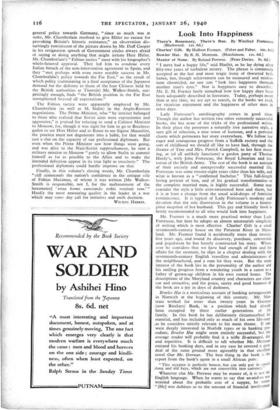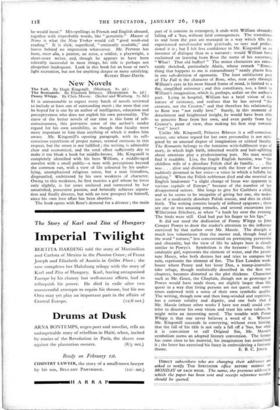Look Into Happiness
There's Rosemary, There's Rue. By Winifred Fortescue. (Blackwood. I25. 6d.) Charles' Gift. By Hulbert Footner. (Faber and Faber. los. 6d.) Bowler Hat. By R. H. Mottram. (Hutchinson. ns. 6d.) Master of None. By Roland Pertwee. (Peter Davies. 8s. 6d.) " I HAVE had a happy life," said Hazlitt, as he lay dying after fifty-two years of turbulent misery. The phrase is commonly accepted as the last and most tragic irony of thwarted bril- liance, but, though achievement can be measured and misfor- tune chronicled, no one can " look into happiness through another man's eyes." Nor is happiness easy to describe: Mr. E. M. Forster lately remarked how few happy days have been adequately described in literature. Today, perhaps more than at any time, we are apt to search, in the books we read, for vicarious enjoyment and the happiness of other men in other days.
Lady Fortescue's autobiography comes in good time. Though the author has written two other extremely successful books, she has none of the tricks of the professional Writer. In their place she possesses a naturally free narrative style, a sure gift of selection, a nice sense of humour, and a perional charm which permeates her story everywhere. We follow her eager and courageous progress from a Suffolk rectory and the sort of childhood we should all like to have had, through the theatre of Tree and Mrs. Patrick Campbell, to her first meet- ing, at (of all unlikely functions) a garden party of Thomas Hardy's, with John Fortescue, the Royal Librarian and his- torian of the British Army. The rest of the book is an account of their entirely and unexpectedly successful married life, Fortescue was some twenty-eight years older than his wife, and what is known as a " confirmed bachelor." This full-length loving portrait of him, and of his gradual transformation to the complete married man, is highly successful. Some may consider the style a little over-sweetened here and there, but it is at least a change from the usual acid-drops of feminine reminiscence. It is typical of Lady Fortescue's modesty and devotion that the sole illustration in the volume is a frontis- piece snapshot of her husband. This gay and friendly book is firmly recommended to all who would look into happiness.
Mr. Footner is a much more practised writer than Lady Fortescue, but here he adopts an almost amateurish simplicity of writing which is most effective. Charles' Gift is a small seventeenth-century house on the Patuxent River in Mary- land. Mr. Footner found it accidentally more than twenty- five years ago, and round its discovery, purchase, conversion and population he has loosely constructed his story. When- ever he considers that we have had enough of him and his affairs for the moment, he slips in a chapter dealing with the seventeenth-century English travellers and administrators of the neighbourhood, and a rum lot they were. But the main interest of the book lies in the personality of the author and his smiling, progress from a wandering youth in a canoe to a father of grown-up children in his own rooted home. The descriptions of the Maryland country and characters are clear- cut and attractive, and the peace, sanity and good humour of the book are a joy in days of darkness.
Bowler Hat is a meticulous account of banking arrangements in Norwich at the beginning of this century. Mr. Mot- tram worked for more than twenty years in Gurneys (now Barclays) Bank, in a position which had already been occupied by three earlier generations of his family. In this book he has deliberately Circumscribed his material, and has included only as much of his own life-story .as he considers strictly relevant to his main theme. If one were deeply interested in Norfolk types or in banking pro' cedure, Bowler Hat might seem entirely successful, but the average reader will probably find it a trifle ill-arranged, dry and repetitive. It is difficult to tell whether Mr. Mottrant enjoyed his banking days, and in any case he covered a great deal of the same ground more agreeably in that excellent novel Our Mr. Dormer. The best thing in the book is the report from the bank'S agent in a small African port: " This acceptor is perfectly honest, but can only pay in camel's dung and old keys, which are not convertible into currency."
Whatever else Mr. Pertwee may be master of, it is not the English language. When he wants to say that so-and-so was worried about the probable cost of a supper, he writes " [He] was dubious as to the amount of financial involvement he would incur." Mis-spellings in French and English abound, together with improbable words, like " genuinity." Master of None is what the New Yorker would call " good week-end reading." It is slick, superficial, " eminently readable," and leaves behind no impression whatsoever. Mr. Pertwee has been, inter alia, a painter, an actor, a soldier, a playwright, a short-story writer, and, though he appears to have been tolerably successful in most things, his title is perhaps not altogether inadequate. Look in this book for an hour or two's light recreation, but not for anything deeper or more satisfying.
RUPERT HART-DAVIS.







































 Previous page
Previous page